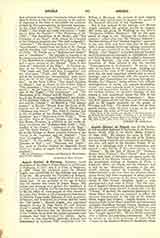

Angelo Clareno da Cingoli, one of the leaders of the so-called Spiritual Franciscans, b. at Fossombrone, about 1247; d. at Santa Maria d’Aspro, June 15, 1337. He entered the order in 1262, or thereabouts. Believing that the rule of St. Francis was not being observed and interpreted according to the mind and spirit of the Seraphic Father, he retired to a hermitage with a few companions and formed a new branch of the order known as the “Clareni”. By the Bull of Sixtus IV, “Dominus Noster Jesus Christus”, the “Clareni” were united to the main body of the order and placed under the obedience of the Minister General. The influence of the prophetical writings of Joachim of Floris, a Calabrian abbot, on Angelo and his followers, and in fact on the “Spirituals” generally of the thirteenth century, cannot be overrated. They all looked forward to the time when the religious orders, whose laxity had been occasioned in great measure by the general looseness of the times, would be restored to their former discipline under a papa angelicus and a new order of Friars. But the number of Angelo’s followers was small; and his so-called reform brought upon himself in particular, and the “Clareni” in general, the suspicious disfavor of the Friars Minor who were not prepared to follow the extreme interpretation of the rule of St. Francis which Angelo had adopted. Angelo became in consequence little better than a homeless and persecuted wanderer, travelling through Greece, Armenia, and the different provinces of Italy until, in 1311, he came to Mignon to answer the charge of heresy that had been brought against him. He was finally acquitted after a tedious and searching examination. In 1337 he retired to the little hermitage of Santa Maria d’Aspro, in the diocese of Marsico in Basilicata, where he died in the odor of sanctity on the 15th of June angel (Cabrol, Diet, d’Arch. Chret., col. 2116 sqq.). of the same year. Angelo Clareno is the author, at The oldest existing examples of winged angels are least in great part, of the “Chronica septem tribu—seen in some bas-reliefs of Carthage and a representalationum Ordinis Minorum”, which records the persecution on ivory of St. Michael, both attributed to the cutions suffered by the “Spirituals“, beginning with fourth century. The latter, part of a diptych in the the innovations made during St. Francis’ sojourn in the East, and continuing under Elias, Crescentius, and Bonaventure. This work is characterized by heroic endurance; but is tinged with bias and bitterness. Another work of Angelo’s that deserves mention is the “Declaratio regulae Minorum.”
STEPHEN M. DONOVAN

